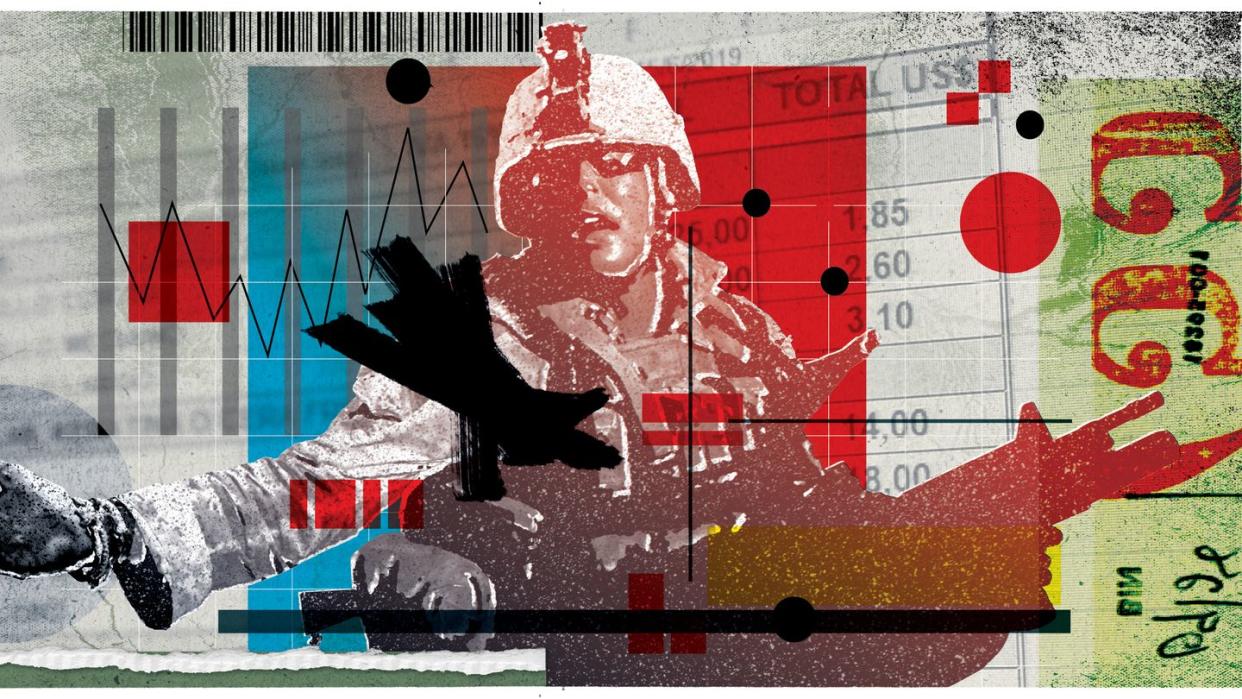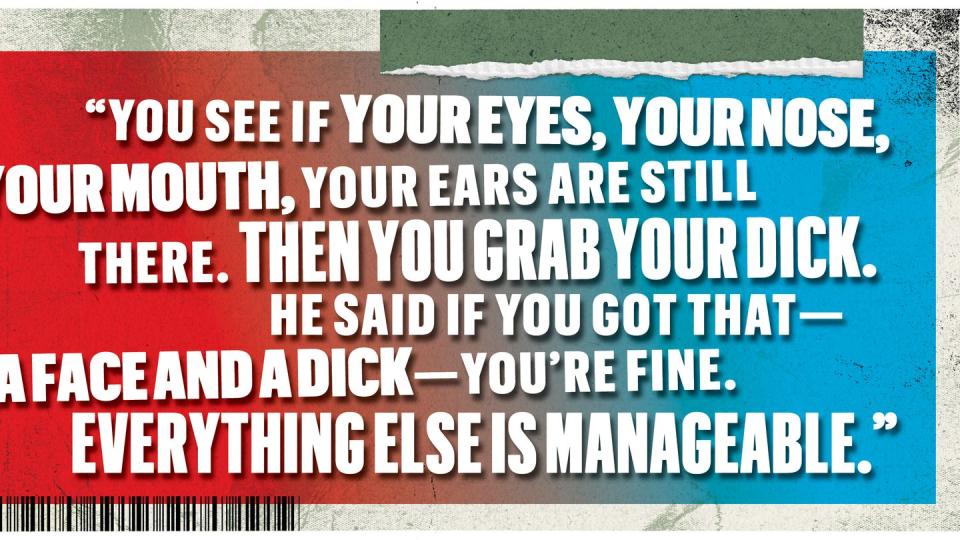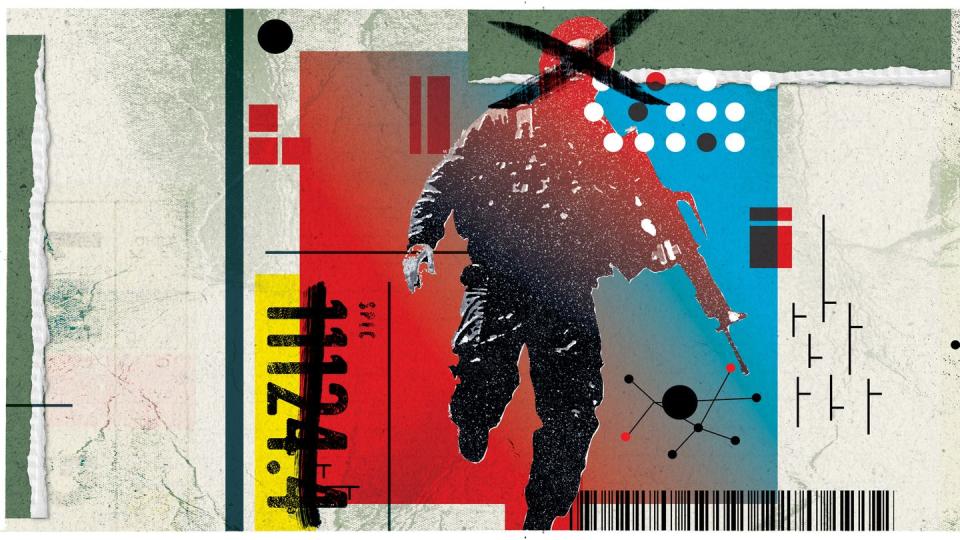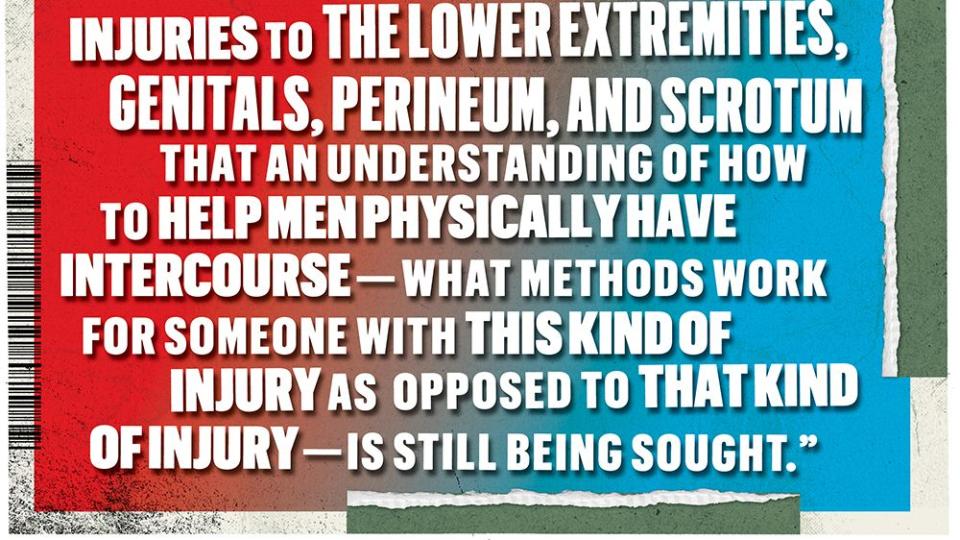From Our Archives: The Signature Wound

"Hearst Magazines and Yahoo may earn commission or revenue on some items through these links."
EDITOR'S NOTE: We've selected the following article as one of our Men's Health Greatest Hits, a story from the archives that represents the best in our brand's history of reporting.
"The Signature Wound"originally appeared in the November 2011 issue of the magazine. Bob Drury conducted the reporting and Mary Ellen Mark did the photography. The piece was a finalist for a National Magazine Award in the “Public Interest” category.
GUYS! GUYS! I need your help. I hit a bomb. I don't have any legs."
In the diabolical scheme of things, it's a minor detail, but it still eats at Tom Bertelsmann*: He had already walked the same damn stretch of trail twice.
The first time was immediately after his platoon's forward observer had been vaporized by an improvised explosive device, or IED, that had been planted under a narrow footbridge leading into a pomegranate grove. Another platoon in the area had also lost a man to an IED, and the two deaths had scotched the afternoon's pincer movement into the orchard, a known insurgent stronghold. His commanding officer ordered the entire Stryker Company, in country for just over a month, to fall back into the adjacent village to reorganize.
They were west of Kandahar City in Afghanistan, and the taut, dark-eyed Bertelsmann, a 25-year-old lieutenant out of West Point, was leading his first combat command. That evening he barely had time to post his sentries and contemplate the loss of his man—all they had found were a twisted rifle barrel and fingernail-size fragments of flesh, bone, and uniform—when the company commander radioed for a meeting with the three platoon leaders.
Bertelsmann grabbed his rifle and made his way through the now-deserted hamlet to the CO's compound, perhaps 20 yards down the dusty path. By the time the parley broke, it was past midnight on a starless night. But Bertelsmann knew the way back. After 12 hours, the Afghan village was beginning to feel like home.
He was not particularly worried about IEDs. Sure, the insurgents came out after dark to plant their bombs. But nobody would be sneaking through the perimeter to lay a mine tonight. That would be insane.
It was August, hot and humid, and Bertelsmann was mere paces from the entrance to his own compound when he stepped on the pressure plate. It must have been buried there all day, a couple of inches below the dirt. He realized immediately what had happened. There was no sensation of being thrown into the air. It was more like the hand of God had come down and squashed him like a bug.
After the explosion he remained conscious, lying on a slant in the crater, his head below his shoulders. He let his head tilt back into the moist soil, wet with his own blood, and he knew. Just knew. He fought the urge to check below his waist, but he couldn't help himself.
His left arm and hand were shredded, so he reached down with his right hand, which was still intact. Where his right thigh should have been there was... space. He fingered a hard nub, inches long with a jagged point—all that was left of his femur protruding from his pelvis socket. He moved his right hand across his midsection and ran it down his left leg. That limb was a bit longer, although it, too, disappeared above the knee.
"I knew my guys were just on the other side of the compound wall," Bertelsmann, who's since been promoted to captain, tells me now. He shifts slightly in his wheelchair and brushes his broad forehead with his left hand. The pinkie is missing. "So I call out, 'Guys! Guys! I need your help. I hit a bomb. I don't have any legs.' I knew I was hurt other places too."
Here Bertelsmann pauses. He slowly twists the cap from a plastic water bottle, takes a swig, and falls silent.

We're in the coffee shop at the Walter Reed National Military Medical Center in Bethesda, Maryland. The other customers pay no attention to him; in this place, the sight of a gravely wounded soldier is sadly common.
To break the silence in our conversation, I mention that earlier this morning I'd visited with two soldiers and a Marine, all in their 20s, in the hospital's vast physical therapy wing. Each man had lost a leg to an IED in Afghanistan. This elicits a grim smile from Bertelsmann.
"AK or BK?" he asks. Above the knee or below the knee?
"One AK and two BKs."
He laughs. "Paper cuts."
"The Marine told me that the first thing you do after the blast is a facial check," I tell Bertelsmann. I feel my head with both hands, mimicking what the Marine had shown me.
"You see if your eyes, your nose, your mouth, your ears are still there. Then you grab your dick. He said if you got that—a face and a dick—you're fine. Everything else is manageable."
Bertelsmann ponders this. He says finally, "Nah. Ears and noses can be put back together, or you can live without them. You can even get by without legs. Trust me, the first thing you check is your dick."
Back in that nondescript Afghan village two years ago, surrounded by his company's three medics, that had indeed been Bertelsmann's instinct. "I don't remember speaking, but apparently at some point I said, 'I have no dick.' But it wasn't true. I lost both testicles, injured beyond repair. But my penis is fine; it still works, thank God. Does everything I want it to. Still..."
The medics pulled him from the crater by his chest rig, drew tight flex tourniquets around his stumps to prevent him from bleeding out, jabbed him with morphine, bandaged his mangled arm, and began an IV drip. All the while, Bertelsmann could make out three voices--his first sergeant's, his company commander's, and his staff sergeant's, each one pleading, demanding, that he open his eyes. A memory intruded, from war movies Bertelsmann had watched as a kid. Wounded soldiers who did not open their eyes died; the ones who did, lived. He would not open his eyes, he decided.
"But then I thought about my parents and my brother." He takes another long swig, draining the water bottle. "Man, my dad would have been so pissed if I had died in Afghanistan. I didn't want to disappoint my family. And then there were the company medics. I was the first living guy they worked on. I remember thinking, I don't want these medics to have to work on me and have me die. I don't want to let them down.
"So I thought, Okay, I'll open my eyes. I'll give it a shot."

"You can't shoot back at an IED."
THE SIGNATURE PHYSICAL of the war in Afghanistan begins when you step on a homemade bomb. Most of these are built with the fertilizer ammonium nitrate, an ingredient widely available throughout Afghanistan.
The detonation, triggered either by a buried pressure plate or, less often, a command wire operated by a nearby enemy, instantly pulverizes the flesh, bone, tissue, and muscle of one or both of your lower limbs. In all likelihood the force of the explosion will sever the nerves in your leg or legs, and yet you will experience little pain. Surprisingly, as shock sets in and you lie in your pooling blood, you may not feel anything but a vague sense of pressure, as if a strong man were wrapping both hands around one of your calves and squeezing as hard as he could.
In many cases, the force of the explosion also travels straight up into your genital and pelvic area, blasting tiny shards of rock and dirt into your torso between your front and rear Kevlar body-armor flaps. If all or part of your "package" is not blown off by the detonation itself, the flying debris from the blast often penetrates soft tissue, leaving you vulnerable to penile, scrotal, testicular, and rectal infections. If the damage is bad enough, it could even lead to a full or partial amputation of your genitals.
Unlike in Iraq, where the most prevalent IEDs are rigged from artillery shells designed to bust up vehicles, the mines in Afghanistan are, in the words of Army combat engineer Command Sergeant Major Todd Burnett, "much more personal."
Iraq has roads. Afghanistan, for the most part, does not. Not good ones, anyway. That means more dismounted American patrols, and more amputees and genital injuries.
In 2010, the number of U.S. troops in Afghanistan who lost at least one limb was double that of either 2008 or 2009, according to casualty data compiled by surgeons at the Landstuhl Regional Medical Center, a U.S. military hospital in Germany.
And three times as many have lost more than one limb—usually both legs. Moreover, the number of severe genital wounds has tripled, causing Pentagon and Department of Veterans Affairs officials to scramble to review insurance packages that assess, for instance, the value of a severed thumb at $50,000 but assign no dollar value on damage to a penis or testicles. (The serviceman may receive monthly disability payments for a genital injury, if the VA deems it serious enough.)
"Everybody was taken aback by the frequency of these injuries," says John B. Holcomb, M.D., a trauma surgeon who contributed to the report.
"The double amputations, the injuries to the penis and testicles. Nothing like this had been seen before in such numbers."
Burnett, 46, has served in both of our current wars. For the past three years, as part of the Department of Defense's Joint IED Defeat Organization, he has taken quarterly trips to Afghanistan. He says there's a big difference between IED incidents in Iraq and those in Afghanistan. "In Iraq, the IED was the event. In Afghanistan, the IED either begins or ends the event." In other words, it's used in ambushes.
As most soldiers can tell you, a firefight is almost preferable to a mine blast. It's rare when any U.S. outfit loses a straight-up battle. The physical and psychological tolls of an IED attack, however, linger past detonation.
"The insurgents are adapting their techniques to counter our technology," writes U.S. Army First Lieutenant Matthew Roll in an e-mail from Afghanistan, where he leads an IED clearance unit. "Some pressure plates are very hard to detect, even with a Husky [a mine-detecting vehicle] or a handheld mine detector. You can't shoot back at an IED. How do you deal with an enemy you can't see or shoot at?"
Ronald Glasser, M.D., who served in Vietnam as a physician, has studied the psychological and physical trauma of war for his recent book, Broken Bodies, Shattered Minds: A Medical Odyssey from Vietnam to Afghanistan. He tells me that during Vietnam there were 2.4 U.S. troops injured for every death. In Afghanistan, current Department of Defense numbers yield a ratio of 8 to 1—largely a result of improved combat medical treatment.
"Everyone talks about the large number of amputations during the Civil War," Dr. Glasser says." But the percentage of all our servicemen and women in Afghanistan who have lost limbs could be equal to or even greater than the percentage of limb loss that occurred as a result of the Civil War. And genital wounds. Jeez, almost everybody.

"You can't get your legs blown off without suffering genital and/or perineum injuries," he says, referring to the groin region. "You mention infections? All kinds of shit gets blown into the wounds from these blasts. How do you clean them out? And because of the initial swelling and such, you don't know for a day or two, probably longer, how much tissue is damaged. The more time it takes to glean this information and make the proper medical decisions, the higher the probability of long-lasting damage.
"The Army doesn't like it," he continues. "Nor does the Army like anybody hearing about it. And there's just so much we don't know yet in terms of treatment. Take testosterone. You need it. For maintaining muscle mass. For sexual desire. A lot of these kids with damaged or lost testicles are looking at a lifetime of hormone treatments. Yet each patient has different dosage needs. How much should you give them? Well, we're still trying to figure that out. Common sense says, 'Declining testosterone? Amp up the levels.' Except that there might be other complications. If you add testosterone to a patient who might be developing prostate cancer, for instance, it's like throwing gasoline on a fire. Nobody knows how to do this yet.
"But I'll tell you one thing. We're going to have to learn pretty quickly. That's one thing wars do—turn medical techniques honed on the battlefield into standard civilian medical practice. Different wars, different tactics, different injuries. Walter Reed, a military doctor, discovered that yellow fever was transferred by mosquitoes and not person-to-person contact; that breakthrough allowed the building of the Panama Canal.
One of the great advances in burn care came out of the sinking of our ships in the Pacific during World War II, when oil burned on the sea's surface. And because of the number of wounded returning from Afghanistan with their genitals blown off, well, we will surely learn from this also. But at what price?"
One immediate cost: These wounds have given our enemies a terribly effective physical and psychological weapon to use against us. Our men who serve are young and able-bodied, and the double threat to their mobility and their masculinity speaks precisely to their greatest dread. I've heard reports of Marines winding loose tourniquets around their thighs before going on foot patrols so they could cinch them if they lost a leg.
So has Dr. Glasser. "Their officers don't like it because they view it as a sign of defeat, but the Marines don't care," he says. "They basically say, 'The hell with it, we're going to wear them anyway. If our legs are blown off, at least we'll survive.' "
In informal conversations, including dozens of interviews for this story, many servicemen said they had also heard of men banking sperm before shipping out to Afghanistan. "The guys who have been deployed to Afghanistan are telling others about to be deployed to store their sperm," says Bertelsmann. "It had never occurred to me. But I tell my friends going on their second or third deployments, 'Hey, store some in case.' I wish I had. I wish the Army had made me."

"Your junk is the first thing you're looking out for. You gotta keep the important things."
LOSING A PENIS is a delicate subject in and out of the service. Military brass, in general, are reluctant to discuss this particular wound. But through a mutual friend, I made contact with a veteran whose penis was so wounded by an IED detonation that it had to be partially amputated.
The phone conversation was brief, halting, and uncomfortable for both of us. After telling me he did not wish to be identified in the pages of a national magazine, he said that the realization that his manhood had been compromised was "worse than death... at first."
"Why live if you can't walk and you can't, well... you know," he said. A young single man, he also lost both of his legs and his testicles. "I got some of the [penile] shaft left—less than half. One side and most of the tip were gone. But my nerves were really damaged. At least in my case, they kind of rebuilt it for me using tissue and flesh from other parts of my body. And they can implant this thing to get you hard. But without the nerves, the sensation just isn't there. Or it's there only a little. You remember what it was like and you think you feel that... and then you don't. Sometimes I don't even realize that I'm sitting on this kind of bobbly thing hanging between my legs."
"The docs aren't done with me," he continued. "But it will take a special girl to understand all of this. I'm not ready for that yet. I don't know if I'll ever be ready for that. And that sucks."
Walter Reed's chief urologist, Colonel James Jezior, M.D., tells me that more and more such patients are arriving at the medical center. "There are areas that we're trying to improve as these guys have gotten further and further out from their injuries. They are going to have to tell us what works. We don't have as much data on this type of injury as we want to have. We've had our own learning curve."

Just under a dozen men have lost all of their genital organs either through IED detonation or subsequent amputation, according to a Walter Reed administrator. And medical center data presented earlier this year at a national urology meeting pins the blame for more than three out of every four cases of genital injuries on IEDs. From October 2003 to February 2011, Walter Reed doctors have seen almost 40 servicemen with injuries to or loss of their penis, and nearly 60 with injuries to or loss of one or both testicles.
Dr. Jezior says the medical science involved in penile and scrotal reconstruction is similar to that of gender reassignment surgery. "The new organ is certainly nothing like the original penis," he says. "It doesn't have the ability on its own to become erect. And if the nerves are not intact after the injury, [the patient] will have less chance of having a good sensation down the shaft. And that's tough. If they are successful in getting even a little bit of sensation back, however, then we'll implant a prosthesis in the penis."
There are additional difficulties. Some men cannot adjust to a rebuilt penis and find it difficult even to urinate. Moreover, a lifetime of complicated and delicate hormone treatments follows the loss of testicles. And even if a man's ability to have sex is technically restored, his experience will vary from past performance; results vary from patient to patient as well.
Says Dr. Jezior, "There is such a wide range of injuries to the lower extremities, genitals, perineum, and scrotum that an understanding of how to help men physically have intercourse—what methods work for someone with this kind of injury as opposed to that kind of injury—is still being sought."
As you would expect, a genital wound causes massive damage to the psyche of a serviceman. This, too, requires further study. Dr. Jezior recalls that early on, surgeons at Walter Reed talked to patients more about the positive aspects of their progress: They were healing. But that reassurance didn't address their main worry. "Their expectations were... uh... higher."
Now servicemen who arrive at the medical center with severe genital trauma are prepped to expect a second devastation soon after regaining consciousness and finding their penis damaged or missing. Says Marine Lance Corporal Michael Martinez, who lost both legs to an IED blast in Helmand province, "Your junk is the first thing you're looking out for. You gotta keep the important things."
He was lucky. His groin was spared.

"Let's face it: You either die of it or you learn to live with it."
MARTINEZ'S WAR STORY is typical. Fifteen months ago, as his unit was returning from reinforcing another Marine outfit that had walked into an ambush, he found what he calls "my mine."
"I was the fourth guy in the patrol. The guys in front of me all stepped on the IED, but nothing happened. I was the lucky one."
Martinez related his tale over dinner at a white-tablecloth restaurant in Bethesda. When he'd walked through the door in his sharp blue business suit, black dress shoes, and striped red tie, several pretty women sitting in a corner booth snapped their heads in his direction. His prostheses were undetectable.
Over coffee he made an interesting observation: "At the hospital I've noticed that the worse the injury, the better the attitude. There are some guys who, say, have been shot or blown up, but they only have shrapnel wounds... and they don't think their lives will go on. But then there are guys who are missing both legs and an arm, and they have the best attitude. The worse off we are, the more we're thankful for what we have."
I'm thinking about those words the next morning as I sit with U.S. Army Captain Bradley Ritland, D.P.T., chief of the physical therapy amputee section at Walter Reed. The sun has only just risen, and Martinez is hard at work. He has one end of a leash-like elastic cord attached to his prosthetic left leg; the other end is hooked onto a physical therapist. Martinez looks like a sled dog as he pulls the therapist around a carpeted track.
"Of the nearly 200 amputees in various stages of rehab that we manage, we always know Mike will be the first one here, and always with a smile," says Ritland, a long, lean 29-year-old from Minnesota.
Ritland and his staff of 12 physical therapists and two technician assistants preside over a huge state-of-the-art facility on the ground floor of the medical center. The oval track encircles scores of treadmills, free weights, treatment tables, and stair-stepping machines. Ritland had earlier reviewed with me the most recent hospital report on the number of patients with limb loss who are receiving treatment here at Walter Reed and at other U.S. military medical facilities. (The current count includes a staggering 32 new patients from June, when IED attacks in Afghanistan hit an all-time high of 1,600.) I was struck by the number of multiple amputees; more than half of the Marines who'd lost limbs in Afghanistan had lost more than one.
Thanks to a change in VA regulations, the government now reimburses most travel expenses to Walter Reed for amputees returning for "tuneups." As prosthetics technology improves--and Walter Reed is already recognized for having state-of-the-art equipment and one of the best prosthetics programs of any hospital in the United States—so will treatment. Ritland nods toward Martinez, who is struggling to maintain his balance as he drags his therapist around the track with the elastic cord, which is now attached to his prosthetic right knee joint.
"You cannot imagine the advances made with prosthetics," says Ritland. "Mike's knee emulates his natural walking motion. The microprocessor knows where he is in his gait pattern and can make adjustments from the feedback it receives from its sensors. Our prosthetics team fine-tunes each leg to accommodate each patient's progress."

THE HOURS PASS, and the Walter Reed physical therapy center fills with more young men missing body parts. As this small but exclusive club has grown over the past months, so too has an informal mentoring program—old-timers working out with new arrivals who have sustained similar wounds. They're careful with each other, though.
"I pretty much leave the new guys alone unless they approach me to talk," says Malik, a 21-year-old Army sergeant from New Jersey who lost his left leg above the knee to an IED in Afghanistan's eastern Wardak province. "I don't want to invade their space. If they ask, I tell them my rehab story, help them out."
Sometimes, says Martinez, a physical therapist or one of the staff psychologists will ask him to help new arrivals. "I remember when I first came in. Sometimes you want to talk to somebody. And there are other times when you just want to be left alone."
And what, I ask, would he say to a fellow veteran who had lost his penis? For once the voluble Martinez has no answer. "What do you say to a kid who hasn't even hit the crest of his life and that happens? I don't know."
One morning at Walter Reed, someone told me about a wounded soldier who had recently been provided with prosthetic testicles—"the biggest pair they make, good only for aesthetic purposes." It reminded me of a demonstration I'd attended at the Pentagon, where officers and civilians from the Department of Defense and the Army who are charged with protecting soldiers were reviewing prototype ballistic underwear and Kevlar codpieces. They laid them out on a conference table so we could inspect them.

The program's project manager, Colonel William Cole, explained the differences between fire-resistant Kevlar boxer shorts and a variety of armored jockstrap-type inventions. In field tests on U.S. bases, he said, soldiers and Marines much preferred the underwear to the chafing codpieces, and 800 pairs had recently been supplied to an Army unit in Afghanistan. Some Marines have received the boxers as well.
A senior navy corpsman attached to one of the Marine outfits told me in an e-mail, "From every report I have read, the boxer shorts are stopping shrapnel and saving genitalia. A navy nurse I know told our captain that the shorts are the main reason many of the casualties she is seeing are keeping their genitalia, thighs, and sometimes femoral arteries intact. I know I will be wearing mine on every single mission we run."
Could this protection have saved Bertelsmann from injury? I think about this during our final encounter. We'd talked about the long-term psychological strain these wounds induce. "There were some dark days," he says, even though his penis still functions normally. "This is a huge lifestyle change."
Then he makes the observation that not every wounded warrior is created equal: "Here at Walter Reed I'm surrounded by other men going through the exact same trials I am," he says. He is "constantly uncomfortable" sitting on his pelvis socket. And he is still learning to walk on the bucket-like contraption he attaches by carbon-fiber waist belts to a prosthetic hip joint that is vacuum-sealed onto his right butt cheek. "If I woke up in this much pain back before the explosion, I'd have been complaining all day."
"But I'm also a realist. Sure, I can't play soccer anymore. I can't be a Ranger anymore. [My] hormones are all messed up. But I'm 27 and I can still have a great life. I can travel, and I do. I have a wonderful girlfriend. I can drive a car. And then I look at the other wounded guys—a lot of these kids are 18 or 20. They're barely out of high school. They have young wives, sometimes young children. They're not officers, they don't have the military degree and the school network hooking them up with jobs."
Bertelsmann is applying to graduate business schools at Stanford, Harvard, Berkeley, and MIT. He hopes to use his education to make a difference in the field of prosthetics. And as long as he remains at Walter Reed as an outpatient, he adds, he will be on call 24/7 to offer assistance to any fellow patients who ask, and sometimes to those who don't.
"I'll see a BK guy in the gym whose therapist is telling him to work harder and the guy wants to take a break. I'll yell across the room, 'Are you kidding me? You have two knees and an ankle. I don't have any of that and you don't see me taking a break.'"
"Let's face it: You either die of it or you learn to live with it," he says finally. "You'd better learn to accept who you are now: this different person. I have, and I'd like to help others who aren't there yet. Lighten things up."
To that end, Bertelsmann and his girlfriend have already planned their perfect Halloween costumes. They are dressing as Lieutenant Dan and the hippie chick Jenny, Forrest Gump's one true love.
*NOTE: This name has been changed to protect the soldier's privacy.
A version of this article originally appeared in the November 2011 issue of Men's Health.
You Might Also Like

